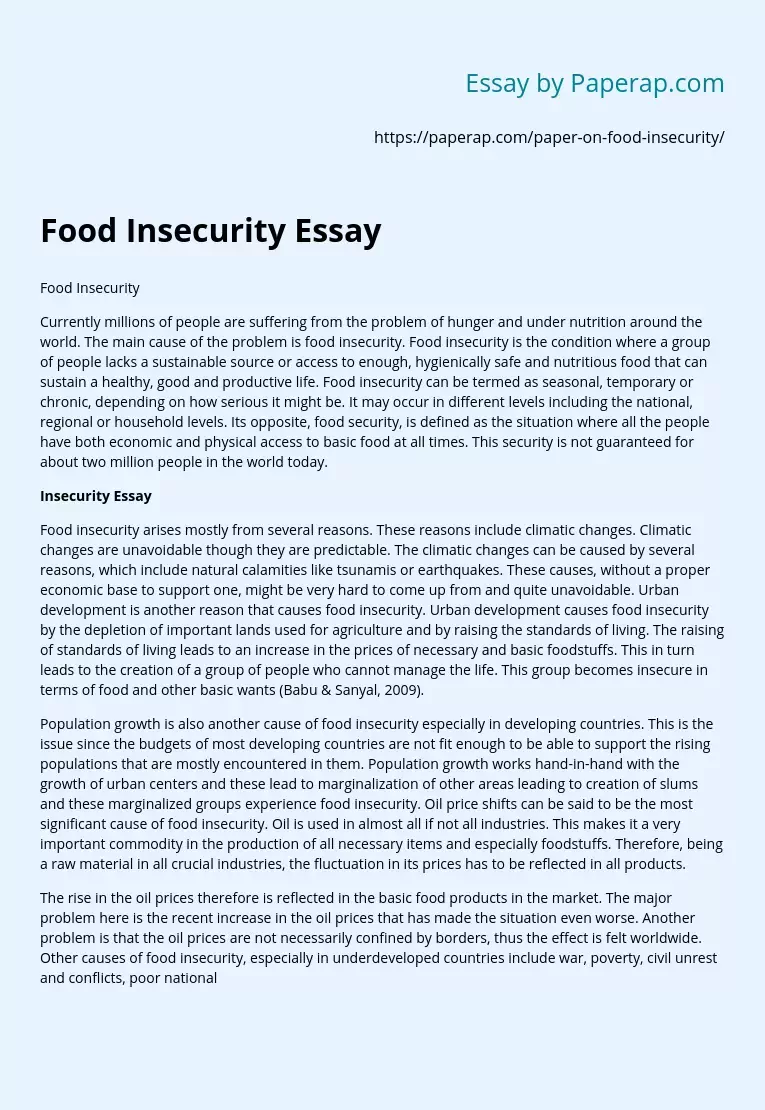Food Insecurity Issue in the World
Food Insecurity
Currently millions of people are suffering from the problem of hunger and under nutrition around the world. The main cause of the problem is food insecurity. Food insecurity is the condition where a group of people lacks a sustainable source or access to enough, hygienically safe and nutritious food that can sustain a healthy, good and productive life. Food insecurity can be termed as seasonal, temporary or chronic, depending on how serious it might be. It may occur in different levels including the national, regional or household levels.
Its opposite, food security, is defined as the situation where all the people have both economic and physical access to basic food at all times. This security is not guaranteed for about two million people in the world today.
Reasons for Food Insecurity
Food insecurity arises mostly from several reasons. These reasons include climatic changes. Climatic changes are unavoidable though they are predictable. The climatic changes can be caused by several reasons, which include natural calamities like tsunamis or earthquakes.
These causes, without a proper economic base to support one, might be very hard to come up from and quite unavoidable. Urban development is another reason that causes food insecurity. Urban development causes food insecurity by the depletion of important lands used for agriculture and by raising the standards of living. The raising of standards of living leads to an increase in the prices of necessary and basic foodstuffs. This in turn leads to the creation of a group of people who cannot manage the life.
This group becomes insecure in terms of food and other basic wants (Babu & Sanyal, 2009).
Population growth is also another cause of food insecurity especially in developing countries. This is the issue since the budgets of most developing countries are not fit enough to be able to support the rising populations that are mostly encountered in them. Population growth works hand-in-hand with the growth of urban centers and these lead to marginalization of other areas leading to creation of slums and these marginalized groups experience food insecurity. Oil price shifts can be said to be the most significant cause of food insecurity. Oil is used in almost all if not all industries. This makes it a very important commodity in the production of all necessary items and especially foodstuffs. Therefore, being a raw material in all crucial industries, the fluctuation in its prices has to be reflected in all products.
The rise in the oil prices therefore is reflected in the basic food products in the market. The major problem here is the recent increase in the oil prices that has made the situation even worse. Another problem is that the oil prices are not necessarily confined by borders, thus the effect is felt worldwide. Other causes of food insecurity, especially in underdeveloped countries include war, poverty, civil unrest and conflicts, poor national policies and corruption. These reasons do not promote the equitable and fair distribution and access of food for all. Others include barriers to trade, environmental degradation, poor agricultural development, low educational levels, gender inequality, poor health and cultural insensitivity (Babu & Sanyal, 2009).
The United Nations has given an estimate of about 840 million people worldwide who are faced with food insecurity. Majority of this number resides in developing countries and most of these countries are in the continents of Africa and Asia. To solve the problem, governments should ensure that food is not only available but also accessible to all. The governments should also ensure that food prices are subsidized in order to cater for the poor and that food is equally distributed in all parts of their countries. Food should also be properly utilized. This means that food should be stored properly for it to be guarded against spoilage, proper handling to guard against diseases and proper preparation to ensure proper nutrition and balanced diets. The balanced meals include a variety of safe and quality foods the proper nourishment. It also includes the proper appropriation of different food groups. With these policies and recommendations followed, the problem of food insecurity shall be solved in time.
References
- Babu, S.C. & Sanyal, P. (2009). Food security, poverty, and nutrition policy analysis: statistical methods and policy applications. New York, NY: Academic Press.
Food Insecurity Issue in the World. (2019, Dec 05). Retrieved from https://paperap.com/paper-on-food-insecurity/

